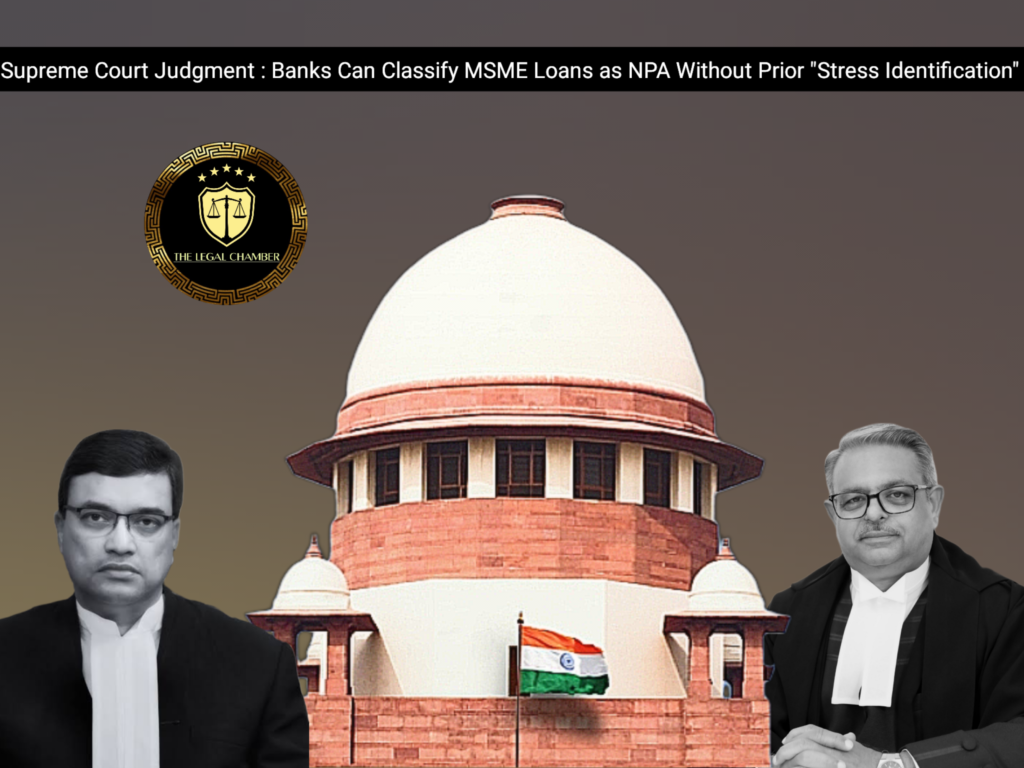
The Supreme Court held that the obligation to identify incipient stress under the MSME Rehabilitation Framework is not a mandatory precondition for a bank to classify an account as an NPA or issue a demand notice under the SARFAESI Act. The benefit of the Framework must be actively claimed by the MSME borrower in response to a notice under Section 13(2), supported by an affidavit, which then obligates the bank to consider the claim and pause recovery actions.
Facts Of The Case:
An MSME-registered enterprise, Shri Swami Samarth Construction & Finance Solution, had availed a loan from NKGSB Co-operative Bank. Upon defaulting on repayments, its account was classified as a Non-Performing Asset (NPA). The bank’s authorized officer subsequently issued a demand notice under Section 13(2) of the SARFAESI Act in May 2024. The enterprise did not object to this classification or the notice at that time. The bank then moved an application before the relevant Magistrate under Section 14 of the SARFAESI Act, leading to the appointment of a Court Commissioner in April 2025 to take possession of the secured assets. The enterprise filed a writ petition under Article 32 of the Constitution in July 2025, challenging the bank’s actions. It argued that the bank was legally obligated to first identify “incipient stress” in the account as per the MSME Rehabilitation Framework of 2015 before declaring it an NPA, and that its failure to do so rendered the subsequent proceedings illegal. The petition sought to restrain the bank from proceeding under the SARFAESI Act, claiming the Framework’s protections applied to it.
Procedural History:
The procedural history of this case originated with the respondent bank initiating recovery proceedings under the SARFAESI Act after the petitioner’s loan account was classified as an NPA. Following the issuance of a demand notice under Section 13(2), the bank applied to the Chief Metropolitan Magistrate for possession of the secured assets under Section 14, which was granted. It was at this advanced stage of the recovery process that the petitioner, for the first time, invoked the writ jurisdiction of the Supreme Court under Article 32 of the Constitution. The petitioner sought to challenge the entire action, arguing a violation of the MSME Rehabilitation Framework. The Supreme Court, after hearing the arguments, dismissed the writ petition at the admission stage itself, finding no merit in the claims and noting the petitioner’s lack of bona fides for raising the MSME defence at such a belated juncture. The court concluded that the appropriate remedy for the petitioner was to approach the Debt Recovery Tribunal under Section 17 of the SARFAESI Act.
READ ALSO :Legal Victory for Farmers: Supreme Court Explains How to Calculate Fair Land Acquisition Value
Court Observation:
In its observations, the Court clarified the operational dynamics between the SARFAESI Act and the MSME Rehabilitation Framework. It held that the obligation to identify incipient stress under the Framework is not a mandatory precondition for a bank to classify an account as an NPA or to issue a demand notice. The Bench emphasized that the Framework imposes a reciprocal obligation on the MSME unit to voluntarily initiate proceedings by filing a verified application and affidavit before its accumulated losses reach half of its net worth, asserting its status and seeking corrective action. The Court reasoned that a contrary interpretation, placing the entire onus on the bank to proactively identify stress in every defaulting account, would render the MSME’s voluntary initiation mechanism redundant. It further observed that an MSME can claim the Framework’s protection at the stage of responding to a Section 13(2) notice, which then mandates the bank to consider the claim and keep recovery actions in abeyance. The Court found the petitioner’s conduct suspect for raising this defence only at the stage of Section 14 execution, having remained silent throughout the earlier proceedings.
Final Decision & Judgement:
The Supreme Court dismissed the writ petition, finding no merit in the petitioner’s claim. The Court held that the bank’s actions in classifying the account as an NPA and issuing a demand notice under Section 13(2) of the SARFAESI Act were not illegal for not first identifying “incipient stress” under the MSME Framework. It ruled that the petitioner’s failure to voluntarily initiate proceedings under the Framework by submitting a verified application and affidavit, especially after receiving the demand notice, precluded it from seeking its protective benefits at such a belated stage of the recovery process. The Court concluded that no case for interference under Article 32 of the Constitution was made out. It clarified that the petitioner’s appropriate remedy, if any, was to approach the Debt Recovery Tribunal under Section 17 of the SARFAESI Act.
Case Details:
Case Title: Shri Shri Swami Samarth Construction & Finance Solution & Anr. vs. The Board of Directors of NKGSB Co-op. Bank Ltd. & Ors. Case Number: Writ Petition (Civil) No. 684 of 2025 Date of Judgement: July 28, 2025 Judges/Justice Name: Justice Dipankar Datta and Justice Augustine George Masih
Download The Judgement Here